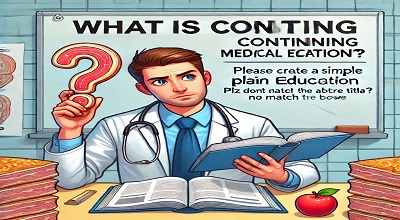Continuing Medical Education
Continuing Medical Education (CME) refers to ongoing educational activities and learning opportunities. Healthcare professionals, particularly physicians, and nurses. And other allied healthcare workers, participate to maintain and enhance their clinical knowledge, skills, and competencies throughout their careers. CME is essential in the rapidly evolving field of medicine to ensure. Healthcare providers stay up-to-date with the latest medical advancements, best practices, and evidence-based treatments.
Here are some key points about Continuing Medical Education:
- Purpose: The primary purpose of CME is to improve patient care and safety by keeping healthcare professionals. Informed about new medical discoveries, technologies, and treatment options. It helps ensure that healthcare providers provide the best possible care to their patients.
- Requirements: Many medical licensing boards and professional organizations require healthcare providers to complete a certain number of CME credits. Or hours regularly to maintain their licenses or certifications. These requirements vary by country and profession.
- Formats: CME activities can take various forms, including conferences, workshops, seminars, online courses, journal articles, grand rounds, and self-assessment programs. The diversity of formats allows healthcare professionals to choose the learning methods that best suit their needs and schedules.
- Accreditation: CME programs are often accredited by professional organizations. Or regulatory bodies to ensure their quality and relevance. Accredited CME activities usually come with a certificate or documentation of completion.
- Topics: CME covers a wide range of medical topics, from general medical knowledge to specialized fields. Such as cardiology, pediatrics, surgery, and more. Healthcare providers can select CME activities that align with their specialties and areas of interest.
More Read…
- Self-Assessment: Some CME activities include self-assessment components, allowing healthcare professionals to gauge their knowledge and identify areas. Where they need further education and improvement.
- Lifelong Learning: CME is a lifelong commitment for healthcare professionals. It encourages a culture of continuous learning and professional development to stay current with medical advancements and changing healthcare practices.
- Patient Outcomes: The ultimate goal of CME is to improve patient outcomes. Healthcare providers who stay updated. And continuously improve their skills and are better equipped to diagnose, and treat. And manage various medical conditions effectively.
- Global Perspective: CME is not limited to any specific country or region. Healthcare providers worldwide engage in CME to ensure that they meet the highest standards of care.
- Ethical Considerations: Ethical issues and professional conduct are often included in CME programs. To reinforce the importance of maintaining ethical standards and patient confidentiality.
Final Words
CME is a critical component of healthcare that supports the ongoing development and competence of healthcare professionals. Ultimately benefiting patients and the healthcare system as a whole. It helps ensure that healthcare providers provide the most current, evidence-based, and safe care to their patients throughout their careers.
